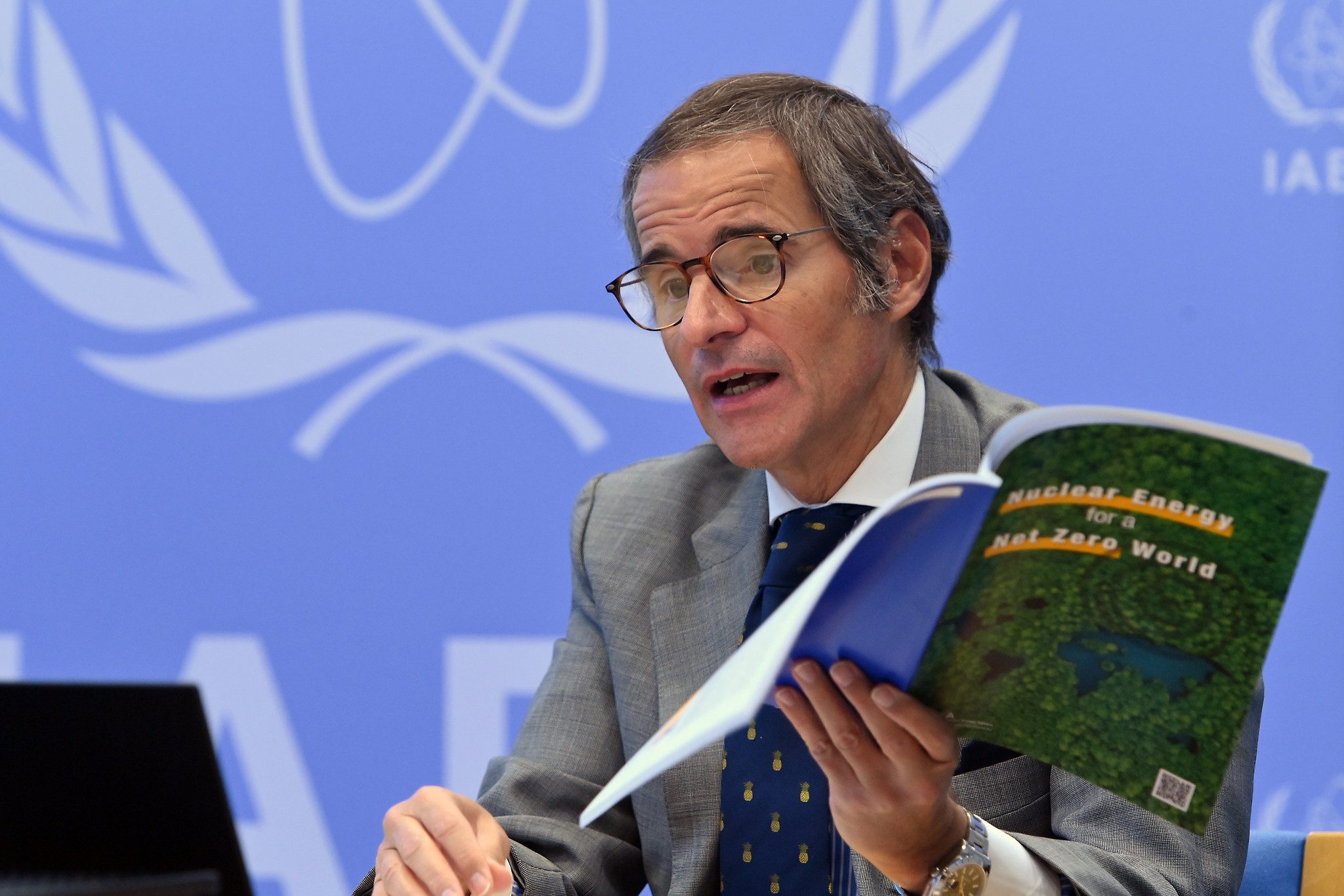The US and E3 members called on Iran to end its violations of the nuclear accord.
The head of the UN’s nuclear watchdog warned of a breakdown in monitoring Iran after it declined requests to repair cameras at a key centrifuge manufacturing site.
In an interview with NBC News on Saturday, International Atomic Energy Agency [IAEA] Chief Rafael Grossi said not granting the nuclear watchdog access to the facility has impacted the monitoring agreement and warned that the world may never be “able to reconstruct the picture” of Iran’s nuclear programme.
“It hasn’t paralysed what we are doing there, but damage that has been done, with a potential of us not being able to reconstruct the picture, the jigsaw puzzle,” Grossi told NBC News on Saturday.
Cameras at the facility in Karaj were damaged in June during an ambush that Iran blamed on Israel, citing its vocal opposition to the restoration of the Joint Comprehensive Plan of Action [JCPOA].
In a September deal, dubbed a ‘stopgap agreement’, between the Islamic Republic and the nuclear agency, Iran agreed to grant inspectors access to service monitoring equipment by replacing memory cards for relevant data needed.
Grossi said Iran allowed the agency to access most of its cameras and replace their batteries as well as memory cards, except the ones at the damaged site.
Iran has in turn defended its latest decision to not grant the nuclear watchdog access to the Tesa Karaj facility saying an investigation over the sabotage remains ongoing.
Concerns over Iran’s nuclear programme have increased since Tehran began ramping up its nuclear enrichment following the US withdrawal from the nuclear accord as well as a series of recent attacks on its facilities.
While Western powers saw Iran’s decision to increase the production as part of measures to develop nuclear weapons, Tehran claimed the enriched uranium will be be used to produce molybdenum to manufacture radiopharmaceuticals.
Grossi also told NBC that he had “no indication” that Iran is developing a nuclear bomb, but warned that North Korea serves as an example of the consequences of failed diplomacy with Tehran.
“The case of the DPRK should remind us of what may happen if diplomatic efforts go wrong,” said Grossi, noting that there is a possibility for the US to re-engage with North Korea over its nuclear activities.
In 2009, IAEA inspectors were denied access to monitor nuclear sites in North Korea, which has since been developing nuclear weapons.
“It’s a clear example, it’s an indication, it’s a beacon. If diplomacy fails, you may be confronted with a situation that would have enormous political impact in the Middle East and beyond,” added Grossi.
The UN official also said he has been struggling to get into direct contact with the new Ebrahim Raisi administration, unlike the former Hassan Rouhani government, expressing his hope in meeting with foreign minister Hossein Amir-Abdollahian soon.
“I hope to be able to have the opportunity to meet with him [Amir-Abdollahian] soon because it’s very important…so when there is a problem, when there is misunderstanding, when there is a disagreement, we can talk about it. I used to have it before, and I would assume that it would be the normal thing,” he said.
The stopgap agreement with the IAEA was reached after Iran stopped providing access to the nuclear watchdog to conduct random inspections. This was a requirement of the 2015 nuclear deal between Iran and world powers.
However, former US President Donald Trump withdrew his country from the JCPOA in a bid to apply “maximum pressure” on Iran, imposing crippling sanctions on its economy.
The latest arrangement was therefore seen as a positive indicator of Iran’s willingness to cooperate with the international community in order to restore the nuclear accord. Per the agreement, countries would be able allowed to witness Iran’s nuclear programme while work to restore the deal continues.
“If and when the JCPOA will be restarted, I know that for the JCPOA partners to go back to an agreement, they will have to know where they are putting their feet,” he said.
Effective diplomacy
Meanwhile US envoy on Iran Robert Malley met with members of the E3—Britain, France and Germany—over the weekend to discuss the role of diplomacy in providing “the most effective pathway” on Iran.
“We are united in the belief that negotiations should resume in Vienna as soon as possible and that they should resume precisely where they left off after the sixth round,” US State Department Spokesperson Ned Price told reporters in Washington on Friday.
Indirect US-Iran talks kicked off in Vienna in April this year to revive the JCPOA following former president Trump’s exit from the White House. Talks paused in June with no outcome as negotiators awaited Raisi’s August inauguration.
“In the meantime, it is urgent and essential that Iran ends violations of unprecedented gravity [of the JCPOA],” said France’s foreign ministry following the meeting with Malley, who was in Qatar, Saudi Arabia and the UAE last week.
In a meeting with Khosro Nazeri, the General Secretary of the Economic Cooperation Organization [ECO] on Saturday, Iran’s foreign minister Amir-Abdollahian said Vienna talks would resume “soon”.
Commenting on the Iranian diplomat’s remarks, Russia’s representative at the Vienna talks Mikhail Ulyanov said: “‘Soon’. Does anybody know what it can mean in practical terms?”
Earlier this month, Iranian officials claimed preparatory talks would be held in Brussels last week, however this was denied by the EU. No such talks took place.
Follow Doha News on Twitter, Instagram, Facebook and Youtube







